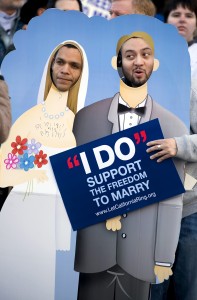
The California Marriage Protection Act, better known as Proposition 8, was passed in 2008, but it appears the two-year legal battle that ensued since then may be nearing an end–or, more likely, an appearance before the U.S. Supreme Court.
The U.S. 9th Circuit Court of Appeals began hearing arguments for and against Prop. 8, passed in 2008 by California voters and struck down by a federal judge in August, an act which went unchallenged by Governor Schwarzenegger and Attorney General Brown. The refusal of state government officials to defend the initiative in court resulted proponents of Prop 8 being granted the right to serve as defendants in the attempt to uphold the measure.
From a legal standpoint, the issue of whether California’s referendum laws are allowed to determine what constitutes the definition of marriage has been decided by an earlier case, Strauss v. Horton, which held that Prop 8 was a valid enactment of an amendment to the state constitution. That acceptance, however, is secondary to whether the plaintiffs’ rights to marriage under the U.S. Constitution have been violated.
While supporters of Prop 8 could claim they had a “personal stake” in Horton–their involvement in using referenda to amend the California Constitution–the sponsors of the initiative cannot claim to have such a stake in whether the rights of homosexuals to marry is guaranteed by the U.S. Constitution. The federal constitutional claims of the right to marry are those of the plaintiffs, and the thousands upon thousands of gays and lesbians who await the decision of the appeals court, and eventually the Supreme Court.
The argument boils down to whether there is any reason to put a barrier on same-sex marriage, or what the court refers to as a “rational basis,” a reasonable rationale for not allowing gay couples the right to matrimony. Prop 8, while denying gay couples the right to “marriage,” allows civil unions, which grant gay couples the same legal rights and responsibilities of marriage, while withholding only the title.
Judge Randy Smith, a Bush administration appointee regarded as the most conservative of the three justices, inquired as to the significance of that title. “You’re left with a word, ‘marriage,’” said Smith. “What’s the rational basis for that?”
The word, according to Charles Cooper, attorney for Prop 8’s defenders, “is really the institution. If you change the word,” replied Cooper, “you change the institution.”
The three judges on the panel were unimpressed. So are we.
Society’s traditional notion of marriage is founded upon the religious aspect, one that binds two people in “holy matrimony.” While we have entered a period of widespread secularism and decline in organized religion, we recognize that completely divorcing American society from those long held conceptions of marriage and family can be hard for some, or many, to accept.
But we believe it is in the best interest of society for all its citizens to be granted equal rights, and the right to happiness and fulfillment is imperative in a free society. No matter what one’s position on morality, homosexuality and the institution of marriage, how can we as Americans, as strong proponents of equal rights for all human beings, founded on the principles of life, liberty, and the pursuit of happiness, deny a fundamental right to that happiness and fulfillment to its own citizens, regardless of their sexual orientation?
During the 2008 campaign, Prop 8 supporters frequently claimed that their aims were to “protect the children,” language implying that gay marriage would result in encouraging children to adopt or experiment with the “gay lifestyle,” or that same-sex marriage would cause children to be preoccupied with issues of sexuality at an early age. We agree with Ted Olson, the lawyer representing the same-sex couples who brought the case to trial, who answered that both notions were “nonsense.”
The idea that children of gay couples somehow operate under a disadvantage has also been discredited by definitive research showing that the children of same-sex couples fare as well as those of straight couples. The American Psychological Association even filed a friend-of-the-court brief in this case on behalf of that research.
It is difficult for Prop 8’s supporters to find a credible defense when asked how legalizing gay marriage will be a detriment to their lives. What is not difficult to ascertain is the damage done by denying gay couples the right to marry, and how that denial serves to create an environment of discontent and discrimination.
Is it right to withhold the right to marriage to gays and lesbians on the basis of tradition? Can an institution such as marriage really be monopolized by heterosexuals?
We don’t think so.
Certainly, the will of California voters stated that a majority wanted to keep the institution of marriage traditional, and should the judges strike the law down, the courts will be seen as overturning the will of the people. This is a valid concern (and one addressed by both sides as a rational basis for upholding Prop 8), but one that is a matter of legal process, and not one that gets at the heart of the issue: the right of our fellow citizens to enjoy the same benefits as the rest of us.











